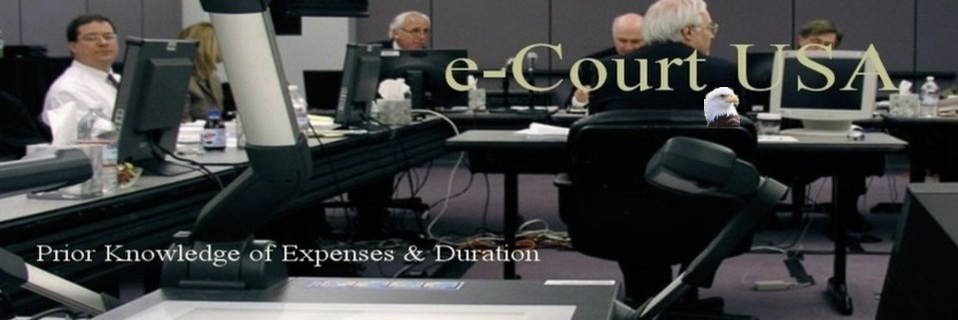The way we resolve disputes, however, has not kept up with other business functions. Commercial transactions may circle the globe in milliseconds, but if a problem arises, resolutions are still largely tied to separate geographical jurisdictions and in-person, paper-bound processes. If business is now largely virtual, dispute resolution is still primarily an in-person endeavor.
One might argue that applying technology to the law with e-filing and legal process outsourcing and ABA Tech Show are sufficient to keep up with the speed of commerce. But adopting these types of technologies, which merely enable preexisting processes to work more efficiently, is insufficient.
We believe that the time has come for the law to embrace the transformative power of technology. If the law is to stay relevant to the challenges presented by global and online business, the system must be reinvented to adapt to the new realities of a networked world.
Enter Alternative Dispute Resolution, or ADR. ADR has long promised efficiency as one of its primary benefits. ADR can save time by expediting processes, providing expert neutrals that require less orientation, and cutting back on delaying tactics and endless discovery. Traditionally we have thought about ADR as, literally, an alternative process. There in the name it is clear that ADR is an alternative to the courts. As Harvard Law Professor and conflict resolution scholar Robert H. Mnookin has put it, ADR works “in the shadow of the law,” always acting as an alternative, never the default.
DEFAULT PROCESS FOR NETWORKED WORLD
But the interesting reality is that ADR is a much better fit with the newly
networked world than the more traditional models represented by the courts.
Paradoxically, as business becomes more global in its effort to increase
efficiency and reduce costs, existing offline legal processes tend to
become less efficient and more costly. In addition, for the majority of
online disputes, the courts are simply not a workable option. The amounts
are so low, and the jurisdiction is so confused, that the courts are really
irrelevant for most cases that arise online. A new kind of ADR, or ODR
(online dispute resolution) as it is being called, offers unique benefits
for this new world of cross-border and low value disputes. As Ethan Katsh,
director of the Center for Technology and Dispute Resolution, has put it,
“there is no A in ODR”—so ODR becomes the default process
for online disputes. This new reality means that for the first time, a
global redress system is being built entirely upon private dispute
resolution, instead of relying on the law.
This is not news to many international organizations, who have been wrestling with the challenges presented by cross-border disputes for many years. After endless conferences and academic studies, the clear international consensus is that we need to build new redress systems to handle these new kinds of cases based on dispute resolution system designs. This is the guiding principle behind United Nations Commission on International Trade Law’s (UNCITRAL) Online Dispute Resolution Working Group, which has involved more than 60 countries over four years in devising a global resolution process for consumer disputes. This is also the motivation behind the European Commission’s proposal to create a mandatory ODR process for all European Union member states that will come into effect in 2015. Many of these designs are based on Internet Corporation for Assigned Names and Numbers’ (ICANN) Uniform Domain-Name Dispute-Resolution Policy (UDRP), which is a global dispute resolution scheme intended to resolve domain name disputes that has been in effect for more than 12 years. For the first time, arbitration is the default resolution process, not an alternative.
In fact, the benefits of dispute resolution match well with the benefits provided by technology, which include cost savings due to reduced travel, and efficient business processes that minimize administrative churn. Why hold five face-to-face meetings when you can instead have two, paired with online meetings to make progress between sessions? Why pay to fly a legal team halfway around the world for a meeting, when you can convene the same meeting via Skype for free? Dispute resolution and technology go hand in hand.
GOING BEYOND EFFICIENCY
But technology introduces new capabilities in dispute resolution that go
beyond mere improvements in efficiency. Of course parties can save costs
normally associated with travel and in-person meetings. In addition,
technology enables asynchronous, text-based processes that can be far more
efficient in reaching workable agreements in short periods of time, without
burdensome scheduling delays. Online processes can also shorten time to
decision by making the information exchange between the parties and neutral
much faster. Many agreements can be achieved through automated or
algorithmic negotiation processes (sometimes called technology facilitated
resolution or TFR) where the computer does much of what a human neutral
would normally do to move the parties closer to an agreement. These
mechanisms can reduce posturing and create strong incentives for parties to
negotiate honestly and in good faith, with an eye on quickly achieving a
mutually acceptable resolution
Technology can also significantly reduce the administrative churn associated with endless document exchange and filing forms. Once an online dispute resolution platform is integrated into a company’s case management or customer relationship management system, a new case can be initiated with a single click. Once the initiate button is pushed, all of the required information is automatically inserted into the case. All the rules, language, and clauses are preselected, so the case can immediately be presented to the respondent. These administrative efficiencies can save many weeks or months of back-and-forth communication in just a single step.
We believe that online tools will soon be an important component of many companies’ management of their litigation portfolios. Because disputes can be handled at lower expense, many cases that cost more to resolve than the amount at issue can now be resolved fairly and economically through expedited online arbitration processes. Low dollar value litigations can be directed to these expedited processes for definitive resolution, as opposed to settling for financial reasons regardless of their merit and creating an incentive for further complaints.
As a leading U.S. think tank for arbitration, the CPR Institute for Dispute Resolution is at the forefront of these changes. Ensuring that online arbitration services are developed in line with arbitration best practices is essential to ensure that these new approaches don’t dilute arbitration quality or create a chaotic second tier of justice lacking transparency and ethics. CPR has partnered with Modria, a leading online dispute resolution technology company that spun out from eBay, to build the first end-to-end online arbitration process that fully complies with the requirements of the New York Convention. This platform can work fully online, or hybrid online-offline, and it offers robust document management and integrated payments. CPR has developed customized, streamlined rules to govern this online process, and all cases will be heard by CPR neutrals with the same procedural protections and conflict checks that are found in CPR’s face-to-face administered processes.
It is very clear to us that everything is moving in the direction of more technology and more online interaction—the only question is how long it will take. In five or 10 years, all arbitration will be online, and we won’t even know the difference. The challenge is ensuring that these changes improve the efficiency and effectiveness of arbitration, and that they help arbitration to deliver on its promise of faster, fairer resolutions.
















